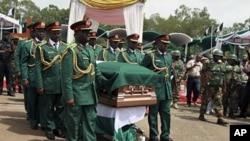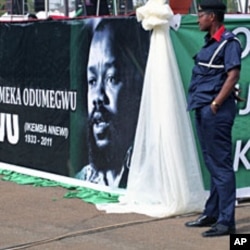Nigerians buried former rebel fighter Odumegwu Ojukwu Friday with high praise and military honors. Ojukwu is best known for declaring independence for Nigeria's Biafra region in 1967, sparking a bitter civil war that killed one million people. The former freedom fighter remains a celebrated figure despite his divisive past.
Mourners, including Nigerian President Goodluck Jonathan, bid farewell to Lieutenant Colonel Odumegwu Ojukwu on Friday at a traditional burial service in his hometown in southeastern Nigeria.
Governor Peter Obi of southeastern Anambra state said they remember Ojukwu as a hero. "Yes, with gratitude to the almighty God that he lived a good life, served his people, fought the injustice of our country and today, the people are beginning to appreciate what he fought for and we are all yearning to continue that fight," Obi said.
In 1967, Ojukwu, then military governor of the southeast, declared the oil-rich region the independent "Republic of Biafra." A failed military coup the previous year by officers from the region's dominant Igbo ethnic group had led to reprisal attacks in northern Nigeria that killed 10,000 Igbo people.
The Igbo are one of Nigeria's three main ethnic groups but have traditionally been marginalized politically.
Ojukwu's declaration of independence plunged Nigeria into a fierce three-year civil war. Of the estimated one million people who perished, most were civilians who died of hunger and disease. The term Biafra became synonymous with images of starving children on Western TV sets.
The government defeated the separatist movement but later pardoned Ojukwu, who returned from exile in 1999 to enter politics, mounting two unsuccessful bids for the presidency.
A sociologist from the University of Abuja, Abubakar Umar Kari, said the renegade's legacy transcends ethnic lines. "Many people, even outside his own group, have saluted his courage, his ability, in the first place, to mobilize his own people and prosecute the 1967 to 1970 war and [then] to come back to the country and fully immerse himself into Nigerian politics," Kari said.
Official respects paid to the former rebel have lifted the curtain on what has been a dark and hushed chapter of Nigeria's past.
That recognition comes at a time when the central government finds itself assaulted by unprecedented, nationwide security challenges.
In the north, radical Islamic sect Boko Haram is waging frequent attacks on police and military targets, as well as civilians. The shadowy group is believed to want stricter application of sharia, or Islamic law, in northern Nigeria.
To the south, the main militant group in the Niger Delta region, MEND, has resumed attacks on oil pipelines, foreign ships, and police. That group has said it is fighting for a fairer distribution of wealth in the oil-rich region.
Sociologist Kari says the dynamics behind the Biafran movement still plague Nigeria today and could give birth to "another Ojukwu."
"Successive Nigerian governments have not been able to sufficiently address the problem of perceived marginalization of many parts of the Nigerian federation. There is also the issue of integration, the issue of equitable distribution of the country's resources," said Kari. "As it was in 1967 and 1970, right now in Nigeria, there are many groups who are agitating for different types of self-determination."
Ojukwu passed away in November. His body arrived in Abuja Monday from London where the 78-year-old had been receiving treatment following a stroke.





